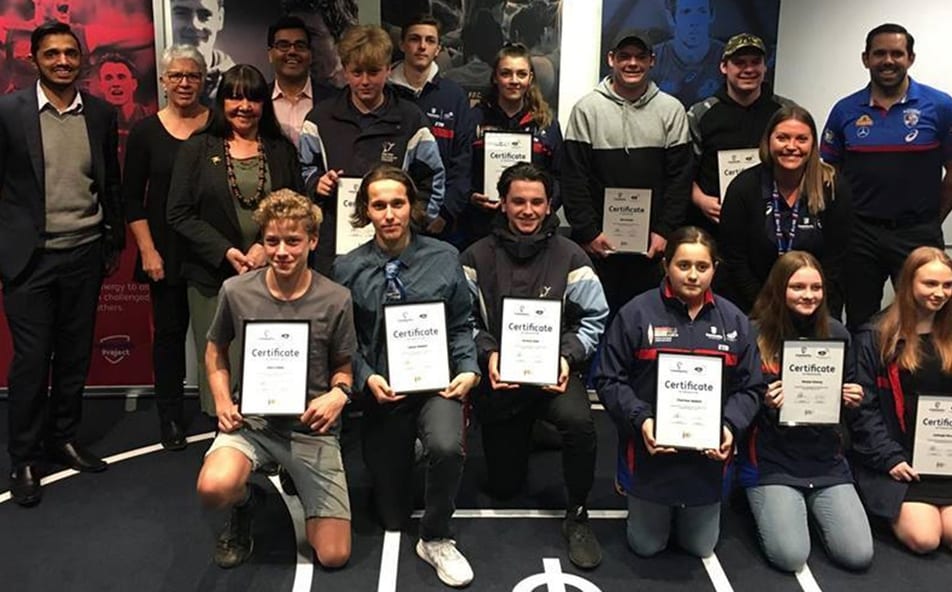link

The AFL’s annual Sir Doug Nicholls Round provides a chance for us all to stop and reflect.
Given the global and national environment we have been confronted with in recent times, this round allows us to reflect on the undeniable impact Indigenous Australians have had on our great game, and more broadly on our country.
Without them, Aussie Rules would simply not be the same. In fact, the game and its origins are anchored with Australia's First Peoples.
The on-field deeds of the League’s Indigenous stars naturally come to mind first. Their flair, speed and athleticism has put footy fans on the edge of their seats for generations.
The Bulldogs have had their fair share of Aboriginal talent represent the Club over the years – think of Michael McLean, the Indigenous Team of the Century member and All-Australian of the 80s and 90s, and more recently of Jarrod Harbrow, Liam Jones, Josh Hill and Brett Goodes.
What’s become even more profound over the last decade, however, is the work the AFL and its clubs have done in creating a greater knowledge and understanding of Australia’s First Peoples - the oldest living culture in the world.
To find the right path forward, we have to understand what has come before us.
The Western Bulldogs are very committed to that cause.
The Club is into the third year of its inaugural Reconciliation Action Plan, established so it could play a part in implementing and measuring practical actions which build respectful relationships with, and create opportunities for, Aboriginal and Torres Strait Islander peoples.
In 2020 it will deliver the eighth year of the Nallei-Jerring Koori Youth Leadership Project, which aims to inspire, educate and encourage Aboriginal and Torres Strait Islander young people to become future leaders in the community.
Through its Next Generation Academy, it is identifying and nurturing Aboriginal & Torres Strait Islander stars of tomorrow, throughout inner-western Melbourne and regional western Victoria.
Last year the Bulldogs confirmed its first Aboriginal Board member, Belinda Duarte, current CEO of Aboriginal-led organisation Culture is Life, the first female executive at Richmond Football Club’s Korin Gamadji Institute and the first Aboriginal executive in the AFL industry.
The Club is also in the process of appointing an Indigenous Programs Manager, a crucial role previously filled by Brett Goodes, which aims to provide leadership, project development and implementation of culturally appropriate Aboriginal and Torres Strait Islander approaches and programs across its administration and football departments.
Education has also been a significant focus for the Bulldogs over the last few years, with cultural awareness training conducted for players and staff, as well as practical workshops and storytelling sessions.
The Bulldogs are committed and inspired by the journey ahead. This week we acknowledge and celebrate the outstanding contribution of Indigenous Australians within the game.
REGISTER FOR THE 2020 NALLEI-JERRING PROGRAM

The AFL’s annual Sir Doug Nicholls Round provides a chance for us all to stop and reflect.
Given the global and national environment we have been confronted with in recent times, this round allows us to reflect on the undeniable impact Indigenous Australians have had on our great game, and more broadly on our country.
Without them, Aussie Rules would simply not be the same. In fact, the game and its origins are anchored with Australia's First Peoples.
The on-field deeds of the League’s Indigenous stars naturally come to mind first. Their flair, speed and athleticism has put footy fans on the edge of their seats for generations.
The Bulldogs have had their fair share of Aboriginal talent represent the Club over the years – think of Michael McLean, the Indigenous Team of the Century member and All-Australian of the 80s and 90s, and more recently of Jarrod Harbrow, Liam Jones, Josh Hill and Brett Goodes.
What’s become even more profound over the last decade, however, is the work the AFL and its clubs have done in creating a greater knowledge and understanding of Australia’s First Peoples - the oldest living culture in the world.
To find the right path forward, we have to understand what has come before us.
The Western Bulldogs are very committed to that cause.
The Club is into the third year of its inaugural Reconciliation Action Plan, established so it could play a part in implementing and measuring practical actions which build respectful relationships with, and create opportunities for, Aboriginal and Torres Strait Islander peoples.
In 2020 it will deliver the eighth year of the Nallei-Jerring Koori Youth Leadership Project, which aims to inspire, educate and encourage Aboriginal and Torres Strait Islander young people to become future leaders in the community.
Through its Next Generation Academy, it is identifying and nurturing Aboriginal & Torres Strait Islander stars of tomorrow, throughout inner-western Melbourne and regional western Victoria.
Last year the Bulldogs confirmed its first Aboriginal Board member, Belinda Duarte, current CEO of Aboriginal-led organisation Culture is Life, the first female executive at Richmond Football Club’s Korin Gamadji Institute and the first Aboriginal executive in the AFL industry.
The Club is also in the process of appointing an Indigenous Programs Manager, a crucial role previously filled by Brett Goodes, which aims to provide leadership, project development and implementation of culturally appropriate Aboriginal and Torres Strait Islander approaches and programs across its administration and football departments.
Education has also been a significant focus for the Bulldogs over the last few years, with cultural awareness training conducted for players and staff, as well as practical workshops and storytelling sessions.
The Bulldogs are committed and inspired by the journey ahead. This week we acknowledge and celebrate the outstanding contribution of Indigenous Australians within the game.
REGISTER FOR THE 2020 NALLEI-JERRING PROGRAM

Comment